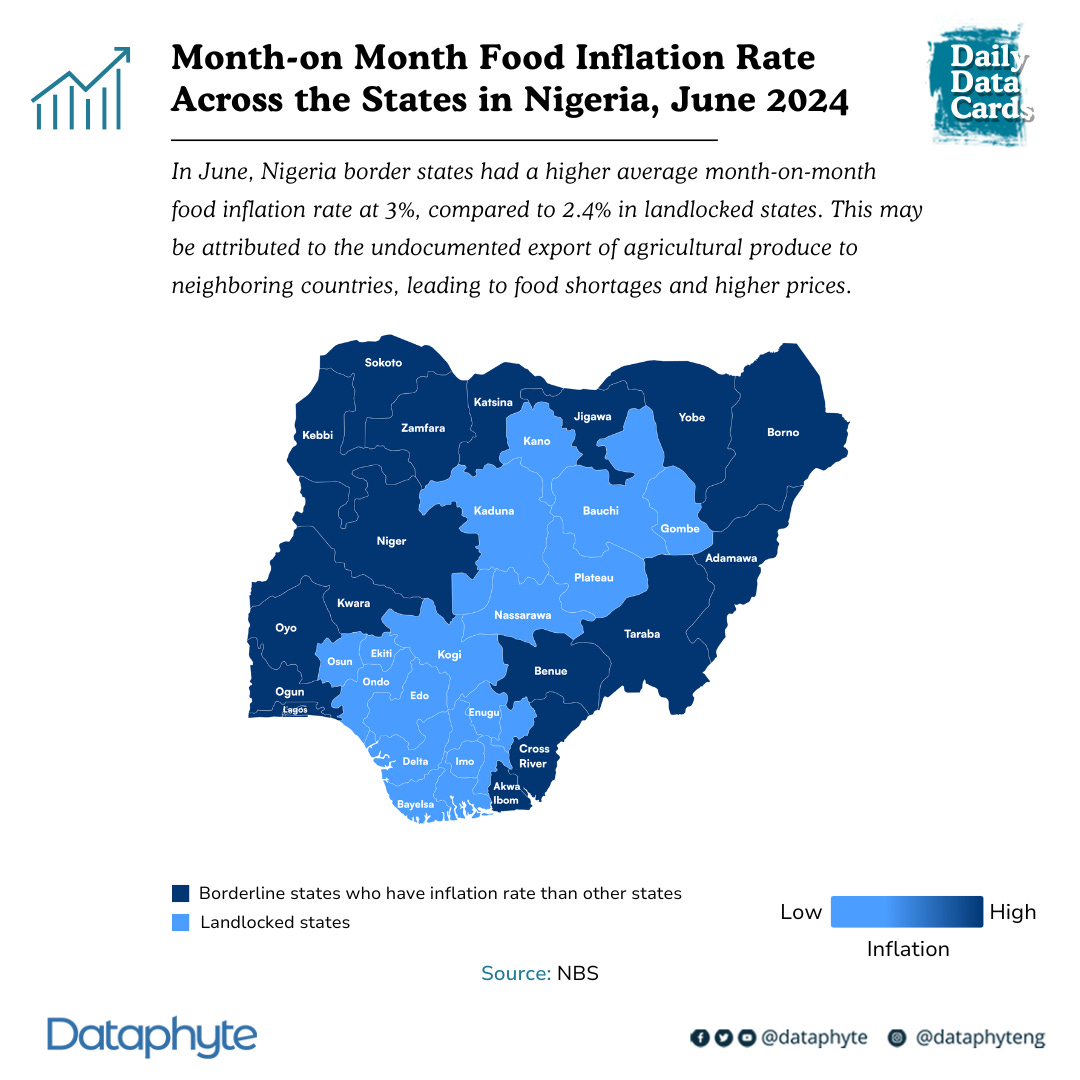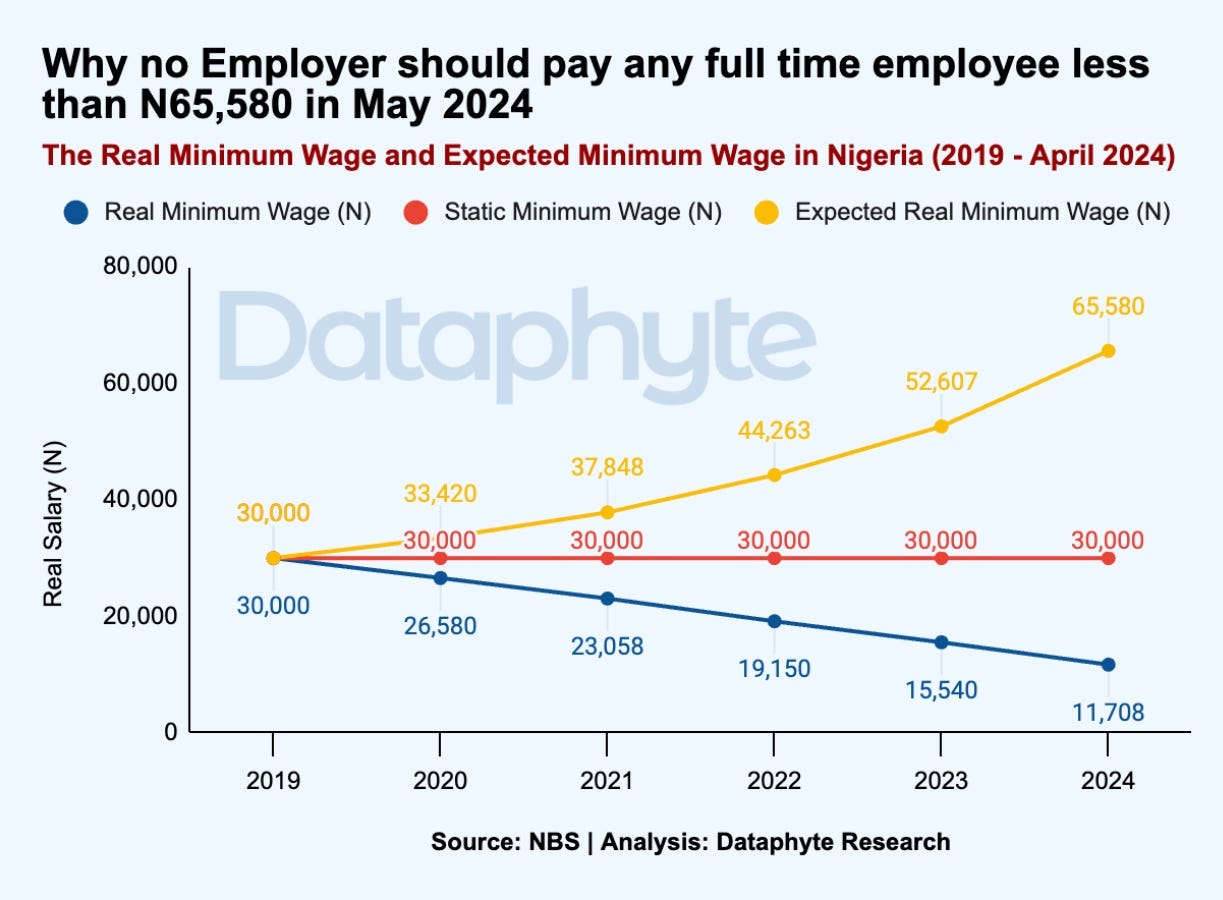A Policy Test for the August Protest
Several groups across the country began a 10-day protest against naira devaluation and a spike in petrol prices, respectively.
Could these twin policies account for all the changes in price levels month on month? Could there be other drivers of food and non-food inflation? Let’s see.
Core inflation increased from 15.7% in June 2022 to 27.4% in 2024. Food Inflation also increased from 20.6% to 40.87% in the same period.
This significant rise in both core and food inflation has severely affected the purchasing power of Nigerians, with many average households struggling to afford food and essential goods.
In a country where 40.1% of the population lives below $2.15 per day, an increase in the inflation rate further deepens deprivations of quality healthcare, education, and housing.
The inflation rate during Tinubu's administration is the highest in the past 25 years.
Besides, all forms of inflation rose the most during the Tinubu administration’s first year in office compared to the first year of previous administrations since 2007.
Policy Test: Are Petrol and Forex Prices responsible for Inflation?
Of these two policies, only fluctuations in the exchange rate have a noticeable connection to the three types of inflation. Changes in petrol prices have minimal or no connection with inflation, casting doubts about the claim that change in petrol price is the primary driver of food and non-food prices.
The moderate relationship between exchange rate fluctuations and the 3 types of inflation suggests a connection to the rising prices of imported and locally grown food.
Higher forex rates increase the cost of food imports and the selling prices too.
The country’s devalued currency also incentivises local farmers and middlemen to transport farm produce across the borders to neighbouring countries to sell at more valuable currencies. This reduces the local food supply and increases the local food inflation rate.
In June, Nigeria's border states had a higher average month-on-month food inflation rate of 3%, compared to 2.4% in landlocked states. This could be due to the undocumented export of agricultural products to neighbouring countries.
The weak to moderate connection of petrol and exchange rates with inflation also shows there are broader underlying issues in food production and supply chains that challenge food price stability in Nigeria.
Nigeria’s food security - availability, affordability, and accessibility - has always been threatened by climate change, low technology, high production cost, limited financing and high post-harvest losses.
Popularity Test: Cost of Living vs Purchasing Power
Amidst the austerities that met its policy outcomes, the Tinubu administration introduced several people-centred policies including the set up of the Nigerian Education Loan Fund (NELFUND) to administer loans to students and more than doubling the minimum wage.
The August protests suggest the Tinubu administration has not garnered sufficient popularity despite its attempts at easing the cost of living and access to higher education, among other people-oriented policies.
For instance, some question whether the new N70,000 minimum wage could counterbalance the high cost of living. Can the extra income withstand the current inflationary pressures that have driven up the prices of goods.?
Dataphyte analysis shows that the real minimum wage that cancels out the inflation rate on the former minimum wage of N30,000 should not be less than N66,000 as of April 2024.
Since 2019, the value of the former minimum wage has steadily declined due to the rising inflation rate each year. By April 2024, the real minimum wage, adjusted for inflation, stands at N11,708. The expected real minimum wage stands at approximately N66,000 (N65,580) according to Dataphyte’s estimations.
While N70,000 seems like a fair inflation-adjustment of the N30,000 minimum wage in 2019, it falls short of the inflation-adjusted living wage of N106,000.
In addition to debates about the fairness of the new minimum wage, questions about who gets it remain unresolved.
The new minimum wage only applies to less than 1.2% of the Nigerian labour force, while the remaining 98.8% fall under categories exempted by the Minimum Wage Act.
Besides the increase in the minimum wage, the Nigerian Education Loan Fund (NELFUND) stated it has now disbursed a total of N2.5 billion to 22,120 students across 12 tertiary institutions in the country.
Since its launch, the student loan initiative has generated numerous reactions. Many undergraduates have voiced concerns about the risk of defaulting and the potential of falling into a debt trap.
While these initiatives aim to enhance the overall welfare of Nigerians, their popularity depends on the effectiveness of their implementation and management.
Political Test: Developing the Southeast, Northwest, and LGs
The only policies that have attracted the least public scepticism and scrutiny are Mr Tinubu’s political masterstrokes. They consist of policies aimed at fortifying the country's political structure.
These include the successful delivery of local government financial autonomy, the move to create Orlu State in the South East, the creation of the South East Development Commission and its northern counterpart, the North West Development Commission.
Local Government Autonomy
On July 11, 2024, the Supreme Court ruling granted financial autonomy to local government areas and declared that statutory allocations should be distributed directly to local government accounts, ending the previous arrangement where funds were deposited into a joint account for states and local governments.
Currently, the Federal Government divides the FAAC allocation between the three tiers of government in Nigeria. The FAAC allocation of 52.7% goes to the federal government, 26.7% to the state and 20.6% to the local governments which is then distributed among the 774 LGAs in the country.
There are differing opinions on this decision. One view holds that it will enhance accountability and transparency at the local government level and foster grassroots development.
Some argue that granting financial autonomy to local governments could disrupt Nigeria's federal structure, interpreting the federal government's direct transfers to local government accounts as undermining the powers of the states.
Creation of Orlu State
A bill for the creation of a sixth state in the South-East region passed its second reading in the House of Representatives. Currently, the North-West has seven states, while the North-East, North-Central, South-South, and South-West each have six states.
The South-East, however, has only five states. The proposed Orlu State will increase the total number of states in the federation from 36 to 37. This new state will comprise parts of Imo, Abia, and Anambra State, with Orlu serving as its capital city.
Like many political decisions, the creation of Orlu State would increase monthly federal allocation (FAAC Revenue) and representation of the Southeast States at the federal level.
South East and North West Development Commission
The federal government signed into law bills, creating two new regional development commissions; The North-West and South-East Development Commission.
The North-West Development Commission is established to oversee the reconstruction of roads, homes, and business premises damaged by various crises, and to address issues related to poverty, literacy, ecological problems, and other environmental or developmental challenges in the North-West states.
Similarly, the South-East Development Commission is created to manage the repair and rehabilitation of roads, homes, and other infrastructure affected in the region, as well as to address ecological and other related environmental or developmental issues in the South-East states.
With the establishment of these commissions, there are now four agencies dedicated to the development of the geo-political zones. The Niger Delta Development Commission (NDDC) and the North-East Development Commission (NEDC) were created to develop the states within these zones.
The only regions left without development commissions are the Southwest and the Northcentral.
All these tests - whether related to policy, popularity among the people, or political restructuring - are intended to measure governance and development on a broader scale. How each protester this August scores the government on these differs.
Peaceful protests can serve as a catalyst for social change and are essential for citizen participation in a democracy. If they turn violent, they can distort the original message and undermine the intended impact.
While citizens continue to express their concerns and the government works to enhance development, both parties still need to engage constructively to forge better methods for achieving mutual objectives.







